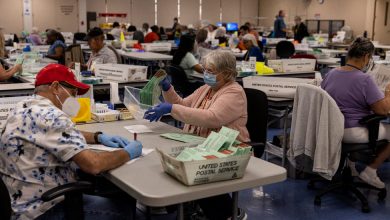Insurers Will Have to Cover 8 At-Home Virus Tests Per Month

WASHINGTON — Private insurers will soon have to cover the cost of eight at-home coronavirus tests per member per month, the Biden administration said Monday.
People will be able to get the tests at their health plan’s “preferred” pharmacies and other retailers with no out-of-pocket costs, according to the Department of Health and Human Services. They can also buy the tests elsewhere and file claims for reimbursement, just as they often do for medical care.
“Today’s action further removes financial barriers and expands access to Covid-19 tests for millions of people,” Chiquita Brooks-LaSure, the Biden administration’s Medicare and Medicaid chief, said in a statement about the new guidelines.
Roughly 150 million Americans, or about 45 percent of the population, are privately insured, mostly through their employers. Each enrolled dependent of the primary insurance holder counts as a member.
At out-of-network facilities, insurers’ responsibility would be capped at $12 per test, meaning people could be responsible for any additional costs.
But if a health plan does not establish a network of “preferred” retailers where patients can get tests covered upfront, it will be responsible for whatever claims its patients submit for their eight monthly rapid tests, with no limit on the price.
Sabrina Corlette,a research professor at Georgetown University’s Center on Health Insurance Reforms, said the policy could save families hundreds of dollars a month.
“I would love to see a more comprehensive national testing policy where these tests are free for everybody, regardless of insurance status,” she said. “Will it help everybody? No. It is definitely not the ideal way to lower barriers to Covid testing. But it is helpful.”
Rapid at-home tests are typically sold in packs of two, ranging in cost from about $14 to $34. That can be prohibitively expensive, especially when tests are purchased in bulk.
Other countries have spent more heavily on rapid testing. In Britain, citizens can use a government website to order free rapid tests for home use. Germany invested hundreds of millions of dollars to create a network of 15,000 rapid testing sites. The United States has instead focused public purchasing on vaccines, and efforts to encourage their uptake.
Some local governments in the United States have invested heavily in rapid testing to counter the latest wave of cases. Washington, D.C., which has experienced a substantial surge in virus cases, now allows residents to pick up four free rapid tests daily at libraries across the city.
The new Biden policy will not apply retroactively to at-home tests that Americans have already purchased. Tests ordered or administered by health providers will continue to be covered by insurance without any co-payment or deductible under a law requiring insurers to fully cover tests at doctor’s offices, public sites and other facilities.
The administration is working on other efforts to get coronavirus tests to people regardless of their insurance status, including a plan to deliver 500 million free rapid tests to the homes of Americans who order them, starting later this month.
That plan, along with the new rules for insurers announced Monday, is part of a broader effort by the Biden administration in recent weeks to catch up to skyrocketing demand for rapid tests, as virus cases have exploded around the nation with the arrival of the highly contagious Omicron variant.
The administration has also announced plans to make tens of millions of free tests available for uninsured Americans at health clinics and other sites in underserved communities. And it has recently opened federally run test sites in hard-hit regions of the country.
Matt Eyles, president of the health insurer trade group America’s Health Insurance Plans, said in a statement that insurance companies would “work as quickly as possible to implement this guidance.”
“While there will likely be some hiccups in early days, we will work with the administration to swiftly address issues as they arise,” he said.
Supplies of the tests at pharmacies and grocery stores all but dried up last month as Omicron descended, and manufacturers are racing to restock shelves, a scramble that has prompted some experts to criticize the administration for being caught flat-footed.
The low availability could hinder the rollout of the reimbursement policy, said Lindsey Dawson, a policy analyst at the Kaiser Family Foundation who has researched the availability of rapid tests.
“If reimbursement exists but there aren’t tests to purchase,” she said, “that doesn’t help an individual consumer.”
She added, “The policy could certainly drive demand, and could exacerbate the problem.”
Ms. Dawson said prices have begun climbing at some major retailers, such as Walmart. That could mean significant upfront costs for families who have to file claims for reimbursement, she said.
The Coronavirus Pandemic: Key Things to Know
The latest Covid data in the U.S. As the Omicron surge causes case counts to reach record highs and hospitalizations to surpass the height of the Delta wave, here’s how to think about the data and what it’s beginning to show about Omicron’s potential toll across the county.
Around the world. In Europe, Germany is bracing for major protests against restrictions after thousands took to the streets in France and Austria, and a tough new vaccine requirement came into force in Italy. In Uganda, schools reopened after the longest pandemic-prompted shutdown in the world.
Staying safe. Worried about spreading Covid? Keep yourself and others safe by following some basic guidance on when to test and how to use at-home virus tests (if you can find them). Here is what to do if you test positive for the coronavirus.
Some health plans also expressed concern about the potential lack of supply when the policy rolls out in less than a week.
“We are concerned that the policy does not solve for the limited supply of tests in the country and could cause additional consumer friction as insurers stand up a program in just four days’ time,” Kim Keck, the chief executive of the Blue Cross Blue Shield Association.
Ms. Corlette, the Georgetown researcher, pointed to several other potential problems with the new policy. The guidance is not explicit about how insurers should design reimbursement systems, so they could make the process onerous, with less user-friendly websites and more hoops to jump through. Nor is there a deadline by which reimbursement must occur.
She added that the policy will exist only for the duration of the Covid-19 public health emergency.
Dozens of Democratic lawmakers wrote to President Biden on Sunday pressing him to expand access to rapid tests, including by manufacturing enough for every American to take at least one a week. They also warned that insurance reimbursement can be time-consuming and could discourage people who are less well off from buying tests.
When Mr. Biden announced the reimbursement plan in early December, he drew skepticism from some public health experts who wondered why the United States was not buying tests in bulk and offering them at little to no cost, as European countries have done.
At the time, Jen Psaki, the White House press secretary, dismissed the idea of a sprawling program to provide free tests to Americans.
But as the administration faced intensifying criticism, Mr. Biden announced that his administration would offer 500 million free at-home tests for the nation’s 330 million residents, available to order through a website that is supposed to debut this month.
There will also be a hotline that people can call if they do not have access to a computer or prefer to order tests by phone, a White House official said.
The administration is racing to sign a series of test contracts with companies already in possession of tests, or with manufacturers; the first two were announced on Friday.
More agreements will be announced in the coming days, officials said. Biden administration officials have said they are being careful not to appropriate tests that are already set to be delivered to retailers like CVS and Walgreens.
It remains unclear how many tests each household will be able to order as part of the program, and what brands will be offered through it. The F.D.A. has authorized more than a dozen at-home antigen tests, including some under a new accelerated review program the federal government announced last year.
The success of the administration’s efforts to get more tests to Americans could also be complicated by preliminary research suggesting that rapid antigen tests may miss some Omicron infections even when people are carrying high levels of the virus. That has prompted scientists to warn about misinterpreting negative results when they have symptoms or may have been exposed to the virus. Experts have continued to recommend using the tests.



